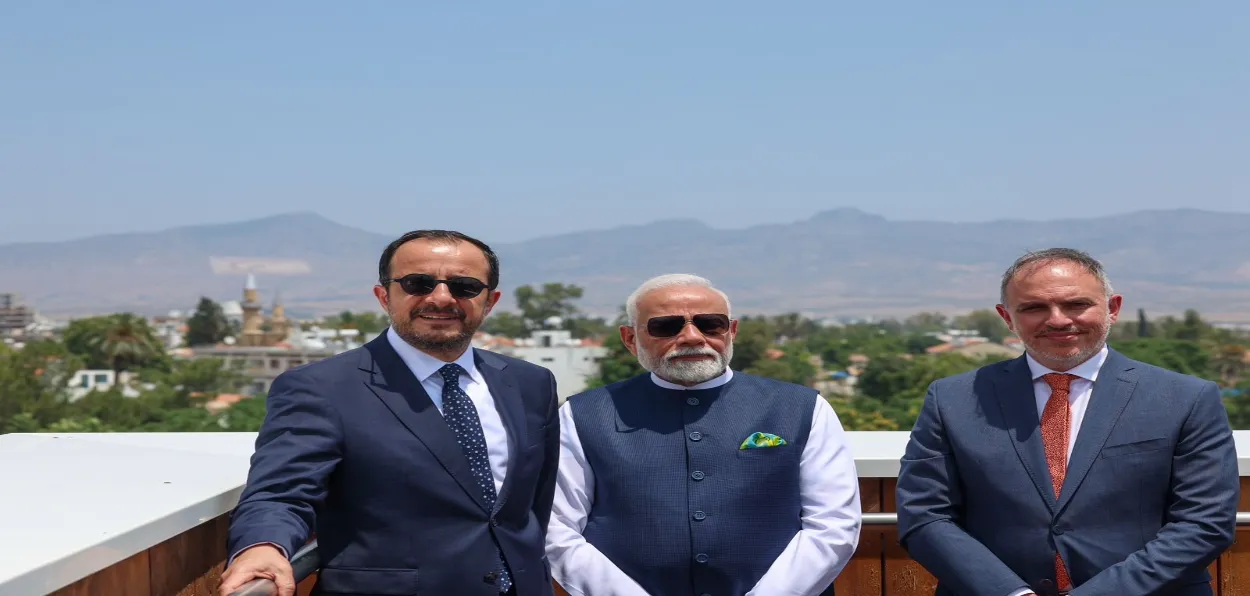
 Shankar Kumar
Shankar Kumar
Amid the ongoing conflict between Iran and Israel, Armenia extended crucial support to India in evacuating its 110 nationals stranded in Iran. These Indian nationals were first allowed to cross into Armenia through the Nurduz-Agarak border. They were subsequently transported to Yerevan, from where a special flight from India flew them to New Delhi.
Evidently, on account of robust ties with Armenia, India has been successful in carrying out the safe evacuation of its stranded citizens from Iran. While this underscores the depth of bilateral cooperation, it also highlights Armenia’s role as a reliable partner in times of crisis. Moreover, it shows how India’s engagement in this part of the world is proving beneficial for New Delhi in addressing its national interests.
A few days back, this engagement with the region received a fresh thrust when Narendra Modi became the first Indian Prime Minister to visit Cyprus in over two decades. Cyprus, lies at a strategic crossroads — bordering Turkey to the North, Egypt to the South, Israel to the Southeast, and Syria and Lebanon to the West. Along with Armenia and Greece, Cyprus forms a formidable axis against Ankara.
While India’s relations with Armenia and Greece have already seen notable progress across several domains, it is with Nicosia that New Delhi now seeks to close the strategic gap. And this intent was manifest when Prime Minister Modi undertook the much-needed visit to the Mediterranean nation.
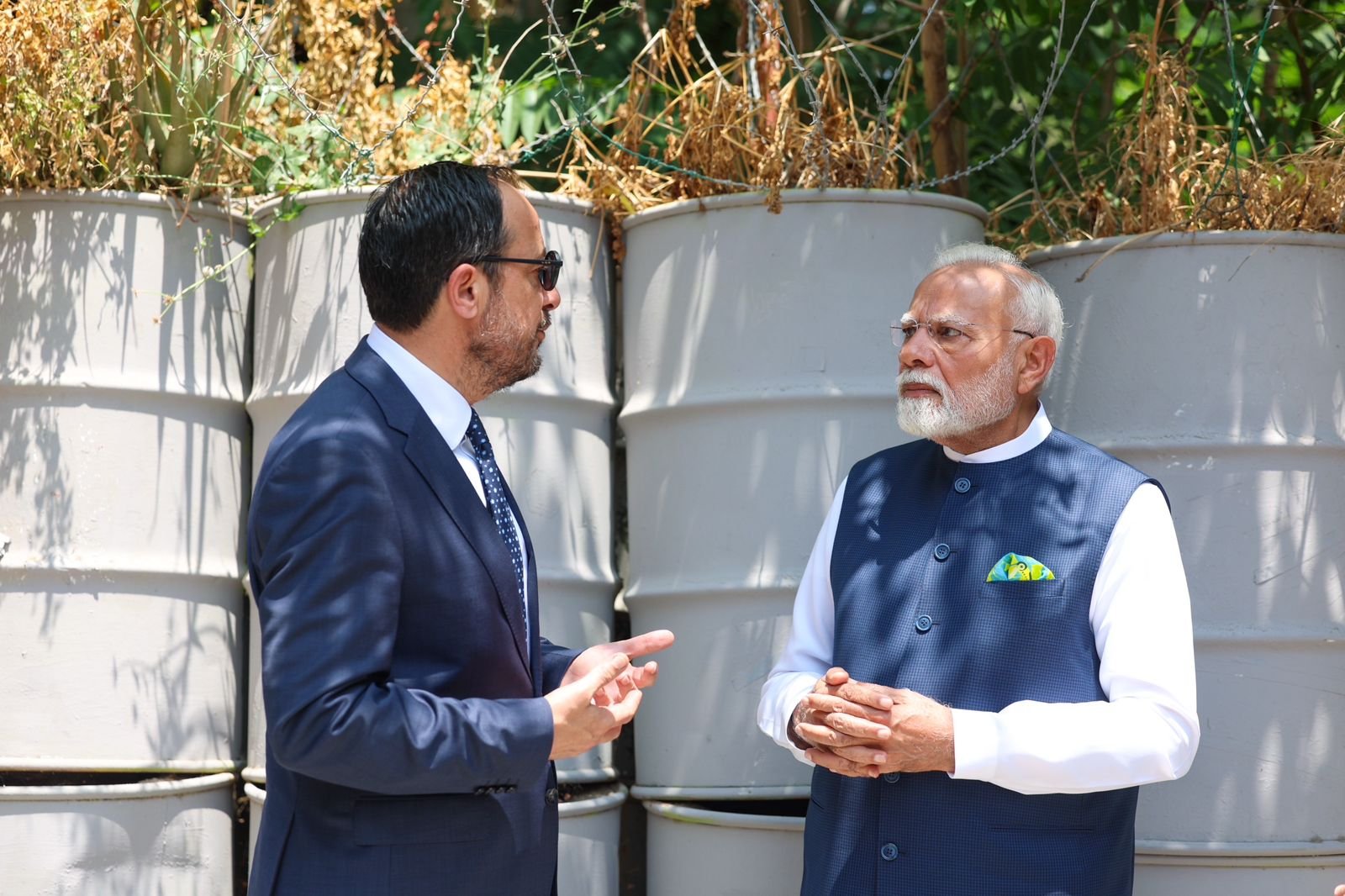
PM Narendra Modi in discussions with Cyprus President Christodoulides
The visit also served as a calculated message to Ankara which aligned with Pakistan by supplying drones and other military hardware during the recent hostilities between New Delhi and Islamabad.
On Operation Sindoor, Turkey extended its support to Pakistan, ignoring India’s concern hinting at Ankara’s arrogance. Its expansionist approach has led to turning countries like Greece, Cyprus, and Armenia into arch-foes in its neighbourhood.
Strain in Turkey-Greece ties
Boasting a military force of about 355,000 active personnel--the second largest in NATO after the US -- Turkey, a few days back, launched its maritime map, outlining economic and military sea rights for Ankara in the Aegean Sea.
This sparked a huge protest in Greece with Athens threatening Turkey to either end its claim or face consequences in terms of “appropriate action in all international fora.” Greece, which shares an approximately 200 km border with Turkey to the east, accuses Ankara of attempting “to usurp areas under Greek jurisdiction” in the Aegean Sea.
The Turkish map claims the maritime zone of numerous Greek islands into Ankara’s proposed maritime jurisdiction. Turkey argues that the Greek islands are not entitled to a full maritime zone beyond 6 nautical miles. But Greece rubbishes it, stating Turkey’s claims are against international maritime law.
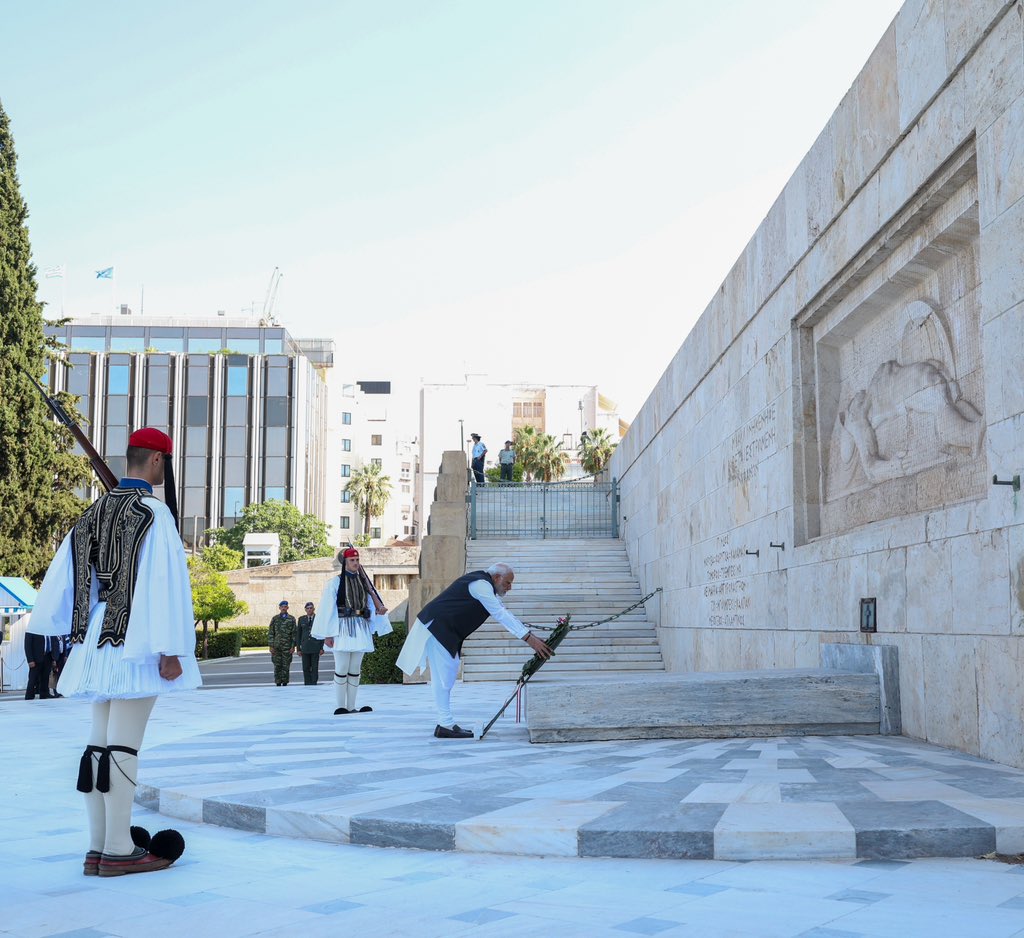 Prime Minister Narendra Modi paying tributes at the Unknown Soldiers' memorial in Athens during his visit in 2023
Prime Minister Narendra Modi paying tributes at the Unknown Soldiers' memorial in Athens during his visit in 2023
Athens cites the UN Convention on the Law of Sea (UNCLOS), which it claims, has extended its maritime zone in the Aegean Sea to 12 nautical miles. However, it is not the first time the two countries have fought over their territorial rights in the Aegean Sea--an elongated embayment of the Mediterranean Sea. In fact, amid deep-rooted mistrust, the two NATO nations clash regularly over territorial rights in the Aegean Sea.
In 2020, tension flared up between the two countries when Turkey sent a survey vessel, escorted by warships, to conduct seismic research in the Aegean Sea.
Greece claimed the area, where Turkey deployed a survey vessel to conduct seismic study, as one that falls in its exclusive economic zone. Terming the activity illegal, Greece asked Turkey to stop its operation in the Aegean Sea. But Turkey continued with seismic study through its survey vessel, escalating tensions between the two countries.
The standoff ultimately led to a collision between their naval frigates in the region. They were on the edge of conflict when France stepped in support of Greece and dispatched two Rafale fighter jets and a naval frigate to the eastern Mediterranean. Under French pressure, Turkey ultimately caved in and halted explorations in the Aegean Sea.
Greece and Turkey have had a history of acrimony and battle. They fought their independence wars against each other and developed their national identities in opposition to one another. In 1830, Greece seceded from the Ottoman Empire, and the Turkish Republic was established after the Greek army was defeated in Asia Minor in 1922. And since 1974, the two countries have been at loggerheads against each other over the Aegean Sea.
Turkey versus Cyprus
In the Mediterranean region, Cyprus is another country that is highly concerned about Turkey’s territorial ambition. In April, just when the world was celebrating Easter, Cyprus and Turkey were locked in an acrimonious battle over the Cypriot Archbishop’s statement in which he accused Ankara of “expansionism.”
Instead of taking recourse to diplomacy and dialogue to handle it, Turkey, which has occupied the northern third of Cyprus land since the 1974 invasion, warned Nicosia that it would not hesitate to act. It underlined Ankara’s increasingly aggressive posture against Cyprus.
Writing about Turkey’s invasion of Cyprus five decades ago, Michael Rubin, a Senior Fellow at the American Enterprise Institute, a Washington DC-based think tank, says, “Turkish arguments that they intervened to protect the Cypriot Muslim population are false. Turkey’s major land grab of more than one-third of the island came after the crisis had passed and against the backdrop of Geneva peace talks.”
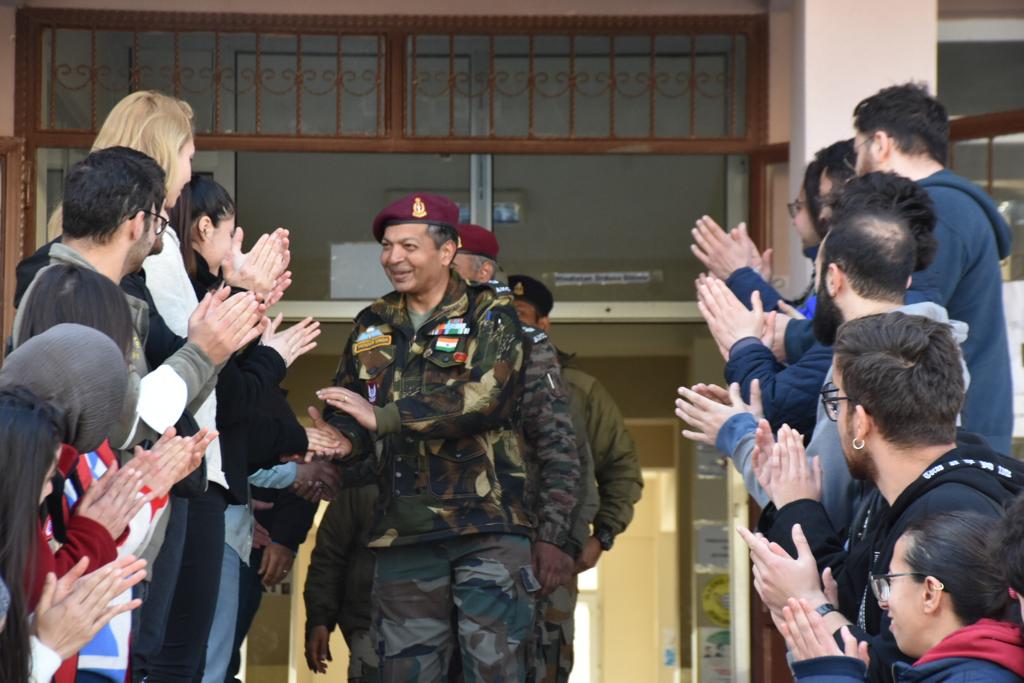 Turkey remains ungrateful: Indian doctors being greeted by locals in Turkey during Operation Dost
Turkey remains ungrateful: Indian doctors being greeted by locals in Turkey during Operation Dost
Calling on the international community to take serious note of Turkey’s continued occupation of Cypriot territory, Michael Rubin accuses Ankara of sponsoring “false separatist movements as a means to fulfill imperial dreams.” Turkey recognizes only the Turkish Republic of Northern Cyprus (TRNC).
In 1983, TRNC declared itself independent, but the UN and its members saw it as a puppet state under effective Turkish occupation. In contrast, the Republic of Cyprus is not only a member of the United Nations but also a key European Union nation since May 1, 2004.
A few days back, Turkey received a major jolt when Central Asian countries such as Kazakhstan, Turkmenistan, and Uzbekistan signed a UN resolution deeming Northern Cyprus as “occupied.” These three Central Asian countries along with Turkey and Azerbaijan are members of the Organization of Turkic States (OTS)---a group built around common cultural and historic grounds.
Yet they decided to give a severe jolt to Turkey when during the European Union-Central Asia Summit in Samarkand, held in the first week of April this year, they signed a joint text that supported two resolutions passed by the UNSC in the early 1980s.
The two resolutions consider the declaration of independence of TRNC a secessionist action that is legally invalid. Experts term it an overt attempt by the Central Asian countries to distance itself from Turkey, the Mediterranean country whose expansionist approach has been a matter of concern for all civilized countries of the world.
Armenia’s strained ties with Turkey
It was more concerning for Armenia when Turkey, under President Recep Tayyip Erdogan, extended full support to Azerbaijan for its military operations in Nagorno-Karabakh, an ethnic Armenian enclave, on September 19, 2023. The military operations had resulted in the occupation of Nagorno-Karabakh, prompting 100,000 ethnic Armenians to flee from the region that year.
While the incident deepened the hostility between Armenia and Azerbaijan, it reopened historical wounds between Armenia and Turkey, rooted in long-standing and bitter legacy. Sharing 311 km long border with Turkey in the West, Armenia holds the Ottoman Empire responsible for the mass killings of Armenians in 1915—often referred to as the Armenian genocide.
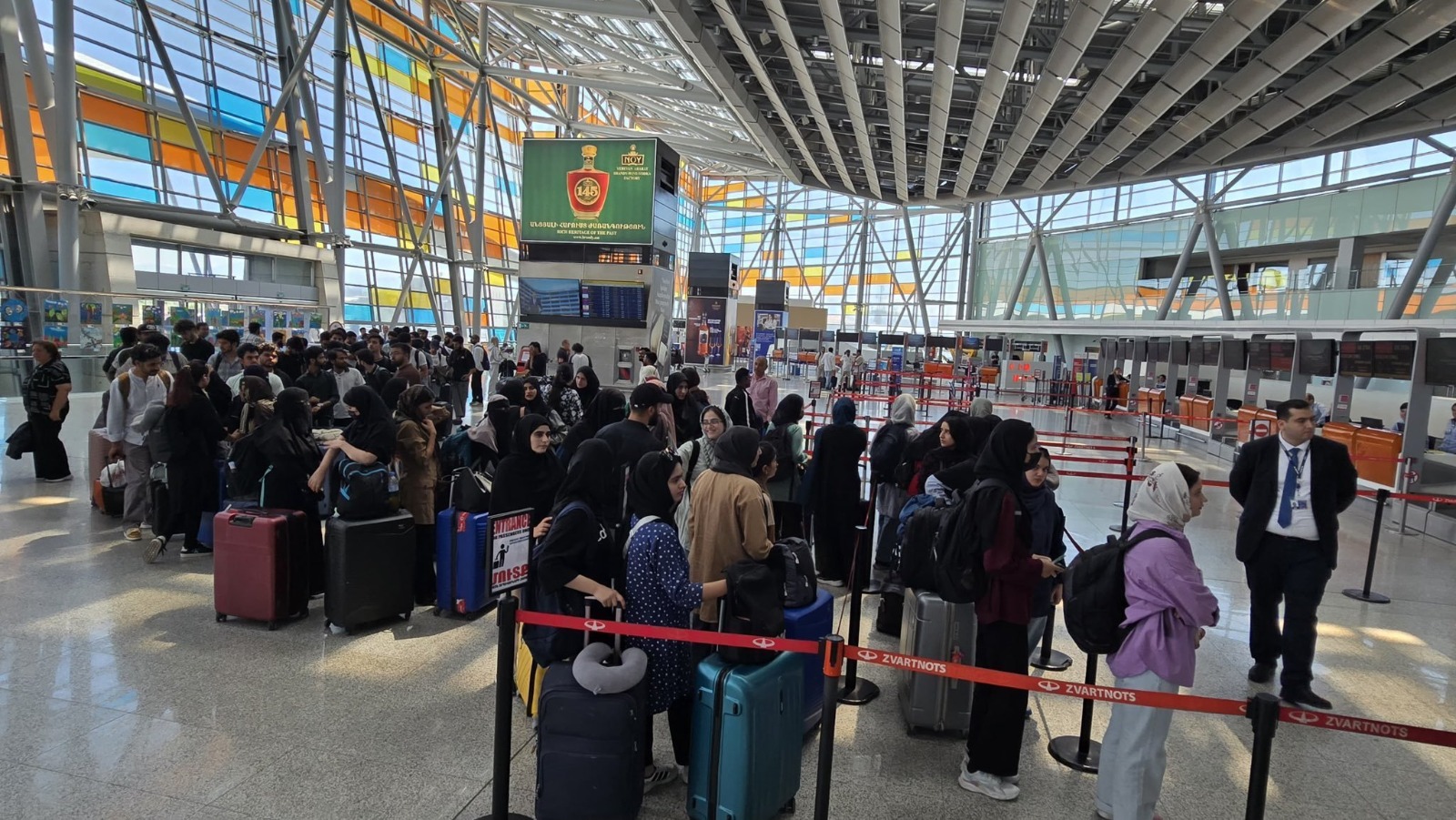
Indians who crossed over from war zone of Iran at an Armenian airport for evacation home
Even today, Armenia and Turkey have not established formal diplomatic ties, while their shared border has been closed since the 1990s.
India’s strategy for the Mediterranean region
Amid such geopolitical realities, India is trying to position itself as a pivotal and reliable partner in the Mediterranean region by offering opportunities for growth, collaboration, and development across a range of sectors to countries like Cyprus, Armenia, and Greece.
For example, with Cyprus, India wants to strengthen cooperation in defense, security, civil aviation, shipbuilding, startups, infrastructure, and innovation. During Prime Minister Modi’s visit, the two countries discussed several issues, including trade and investment.
In 2023-2024, bilateral trade between India and Cyprus stood at $136.96 million. Cyprus is among the top 10 sources of Foreign Direct Investment in India. There are hints that Cyprus may become the second European Union country after France to adopt India’s UPI for cross-border transactions.
However, the most important development, witnessed during Prime Minister Modi’s Cyprus visit, was the inauguration of the India-Greece-Cyprus (IGC) Business and Investment Council. This trilateral platform will help the three countries forge new regional dynamics and leverage collective strength in shipping, renewable energy, civil aviation, and digital payment services.
Then Cyprus, situated strategically at the crossroads of Europe, North Africa, and the Middle East, will prove immensely important for New Delhi in fulfilling its India-Middle East-Europe-Economic Corridor (IMEC) ambition.
Greece is another Mediterranean country that has shown keen interest in partnering with the IMEC project. This was part of a discussion when Greek Prime Minister Kyriakos Mitsotakis was on a two-day visit to India in February last year. In the fast-evolving geopolitical situation across the world, Greece has emerged as India’s trusted friend which has stood by it on all key issues, including Jammu and Kashmir.
The Greek Foreign Ministry strongly condemned the terrorist attack in Jammu and Kashmir on April 22. While expressing solidarity with India, the Foreign Ministry of Greece described the killing of 26 people in Pahalgam as “heinous” and a “tragic loss.” During an all-party delegation visit to Greece, post ‘Operation Sindoor,’ Athens endorsed India’s boycott of Turkey for supplying arms and ammunition to Pakistan.
According to Greek daily Ekathimerini, Turkey is highly worried about India’s growing engagements with Athens. India is “exploring strategic investments in Greece, targeting defence industries, ports, tourism, and potential labour agreements,” Greek daily Ekathimerini said.
Turkey is also concerned about India-Greece commitment to double their bilateral trade by 2030. As per the Department of Commerce, India-Greek bilateral trade in 2022-23 stood at approximately $2 billion. To the chagrin of Ankara, in the defense area, both Greece and India have scaled up cooperation ranging from conducting joint military exercises to establishing office-level Joint Working Group (JWG) mechanisms to enhance military-to-military cooperation between the two countries.
In Armenia, India is regarded as a true partner which has stood by Yerevan through thick and thin. Today, both countries are building cooperation in areas such as IT, pharmaceuticals, renewable energy, green technology, tourism, and disaster resilience projects.
However, it is ongoing defense cooperation between India and Armenia, which has drawn international attention as it has contributed to Yerevan becoming a major source of arms import from the South Asian country. Armenia has acquired from India defense systems like Swathi radar, Pinaka MLRS, Akash missiles, anti-tank and anti-drone systems, and Advanced Towed Artillery Gun System.
ALSO READ: Mohammad Hafeez Furqanabadi: Harbinger of education, harmony, social change
India and Armenia have also expanded their economic partnership. Although in 2023-24, the two-way trade between the two countries was merely $131.38 million, they have agreed to enhance the basket of commerce between them. Both countries are exploring cooperation in renewable energy, artificial intelligence, and infrastructure development.
